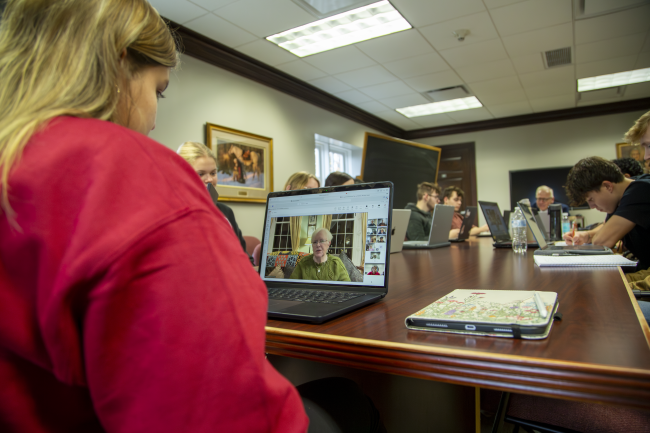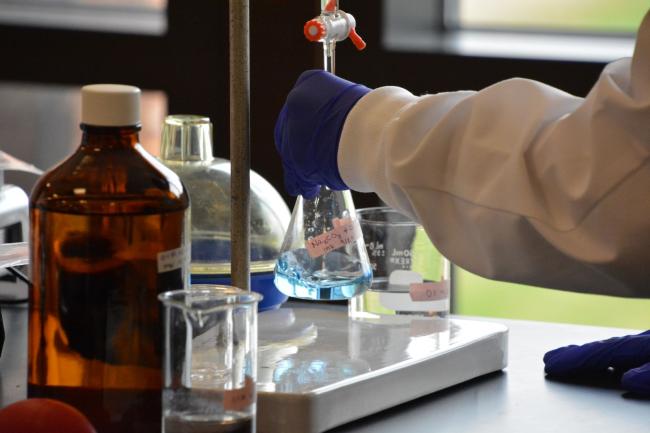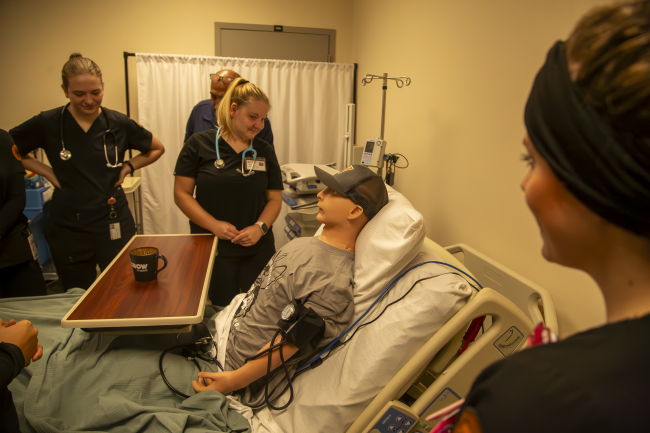Waynesburg University recently held its 13th Annual Undergraduate Research and Scholarly Work Symposium, where students from a variety of disciplines had the opportunity to present their research to over 100 attendees from the campus community.
Research was presented in the form of five podium presentations and 17 poster presentations with participation from a total of 26 students. Winners for the best oral presentation and poster presentation were determined by a committee of faculty and community judges at the end of the symposium.
Hailey Crusenberry, a junior pharmaceutical science major, was awarded the best oral presentation for her project titled, “Directed Evolution of Cytochrome P450 for Honokiol Natural Production.” Senior biology major Cameron Frame was awarded the best poster presentation for her project titled, “Determination of Pain Tolerance Difference of College-Aged Biological Males and Females at Waynesburg University.”
“The WU Undergraduate Research and Scholarly Work Symposium provides a unique forum for undergraduate students across disciplines to present scholarly projects completed while enrolled at Waynesburg University,” said Dr. Christian Hayes, assistant professor of biology and director of marine science at Waynesburg University. “As part of the event, students present oral and poster talks to the WU community and receive valuable feedback on their work from faculty judges. I am immensely proud of the level of scholarship all of these students put into their projects this year, and I am excited to see where God will take them after they graduate.”
The research presented at the symposium represented a total of 12 different majors on campus, which included applied sciences, biblical and ministry studies, biology, biomedical science, chemistry, computer science, environmental science, forensic science, health and exercise science, nursing, pharmaceutical science and psychology.
Research for Crusenberry’s project began her freshman year as part of a grant proposal earned in 2021 through the National Science Foundation (NSF). Through her research of the natural product called Honokiol, which is shown to possess anti-cancer and anti-inflammatory properties but is difficult to synthesize, Crusenberry’s goal is to “use naturally occurring enzymes to create this product in greater amounts for clinical application.”
“The benefits of attending and presenting at the Waynesburg University symposium are endless, as you gain real-world experience in communicating your research to both the scientific and non-scientific community, bridging gaps,” she shared. “Allowing myself to get other people passionate about the future of science and medicine is so rewarding, in my opinion, especially when it comes to diseases with death-causing effects and very few current treatment options.”
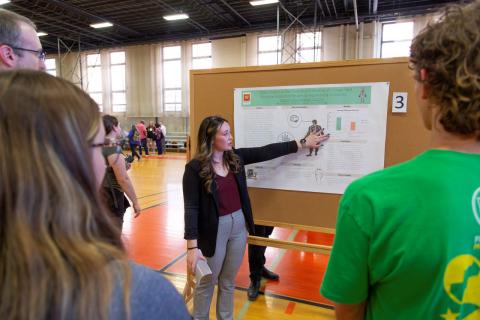
For Frame, the brainstorming process for research topics began during her junior year. Through her interest and research in the differing ways heart attacks often present in males and females, she became intrigued by the possible correlation of pain tolerance and heart attack presentations. That led her on a hunt toward discovering an answer.
“When I was tasked this year with finding a topic for research, I knew I wanted to pursue pain tolerance to hopefully answer my question regarding the correlation between heart attack presentation and pain tolerance someday,” Frame shared. “I ultimately decided I would start at the beginning with studying the differentiation in pain tolerances of biological males and females at Waynesburg University.”
By participating in the symposium and seeing the hard work of everyone involved, Frame said she discovered just how important it is for research communities to share their research with each other and the world.
“While I was lucky enough to score the highest for the poster presentations, I think it goes without saying that every individual who presented deserves to be commended for the time, effort and thought they put into their individual projects. The professionalism, intellect and passion in the room was unfathomable, and I am so grateful to have been a part of it,” she said.
The ability to conduct and present research through various stages of a student’s time is an invaluable experience for all involved, preparing each student to have the confidence to excel in their desired fields.
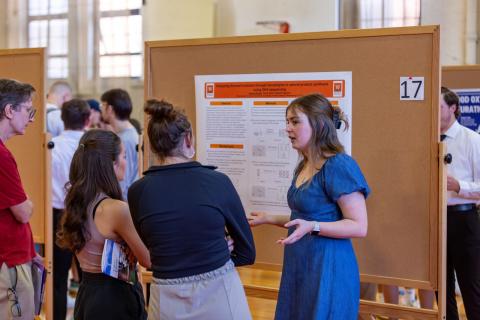
“This was my second year participating in the annual research symposium, and I can gratefully say that it has allowed me to grow in confidence by knowing that the work that I have completed has an impact. This opportunity has allowed me to lay the groundwork necessary for future research positions, as I feel prepared to speak confidently on any topic in front of esteemed individuals,” said junior forensic science major Rachel Bright, whose research project, titled “Analyzing directed evolution through biocatalsis in natural product synthesis using DNA sequencing,” focused on using mutated E. coli cells for the purpose of increasing natural product output.
